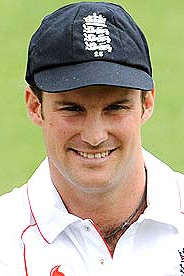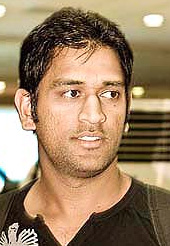LONDON, (Reuters) – England captain Andrew Strauss expressed reservations yesterday about the decision to dispense with ball-tracking technology during the four-test series against India starting at Lord’s today.

The Indian cricket board has refused to accept any ball-tracking technology in the series which means players will be not be able to ask for reviews of leg-before-wicket decisions. Both governing bodies must agree before the system can be used.
Strauss told a news conference he thought the Decision Review System (DRS) had worked well over the past 12 to 18 months.
“I think we are getting more decisions right as a result of it,” he said. “It’s a good thing but as it happens we can’t use the full DRS in this series.
“We are going to have to deal with the kind of halfway house we’ve got at the moment. I don’t think it’s ideal but that’s the situation we face ourselves with.”
Strauss’s counterpart Mahendra Singh Dhoni said the Indians were not 100 percent convinced about the reliability of ball-tracking technology to show whether a ball would have hit the stumps.
“Until we are 100 percent satisfied we will not really go with something that is not 100 percent satisfactory to our views,” he said.
An International Cricket Council (ICC) statement released on Wednesday said the minimum standards of infra-red technology and stump microphones would be used during the series to help adjudicate on catches.
ICC chief executive Haroon Lorgat said it was common knowledge that the world governing body and the England and Wales Cricket Board would have liked ball tracking to allow lbw decisions to be reviewed.
“The last chief executives committee and board meeting in Hong Kong agreed to independently confirm the accuracy of ball-tracking technology. This will now take place as a matter of urgency,” he said.
BROAD OR BRESNAN?
Both captains said they had decided on their final XI for the 2000th test and the 100th between the two countries but both declined to say who had been included.

Pace bowlers Stuart Broad and Tim Bresnan will be competing for the final spot in the England team. Broad left the Ashes tour of Australia early because of injury and failed to make an impact against Sri Lanka earlier in the English summer.
“I am pretty clear,” said Strauss. “It’s a tough decision, all 12 players in the squad have got very strong merits to playing the final XI.”
Strauss was at pains to point out that Broad’s role in the side was not that of an enforcer employed to bowl primarily short-pitched deliveries.
“Stuart Broad’s role in the side is not fundamentally different from anyone else. He’s there to bang out a length consistently and work in conjunction with the other bowlers as a bowling group to take wickets,” he said.
“One aspect of his game which I think gives him a little bit of an edge is that he’s got a very good bouncer, he can make life difficult for batsmen with the short ball but that doesn’t mean that he’s the enforcer all the time.”
“It just means that occasionally there might be spells in which he goes short.”
Strauss, whose team can overtake India as the world’s top side if they win the series by a two-match margin, said no side had been better than England over the past two years.
“Ultimately our goal over the long term is not just to be the side that on the rankings is number one but to be the side that everyone generally agrees is the number one. That’s still a long-term goal. Nothing changes whether we win or not,” he said.
Dhoni, unbeaten in 10 series as captain, said every series was important to a team who also won the 50 overs World Cup this year.
“Each and every game I play is tough and every series is a chance to prove ourselves as cricketers and prove ourselves as a team,” he said.




